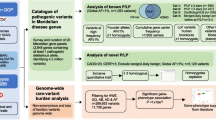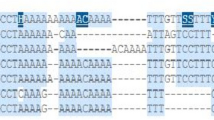Abstract
Lynch syndrome is an autosomal dominant disorder due to mutations in DNA mismatch repair genes, causing young onset colorectal cancer and extra-colonic cancers such as endometrial and stomach cancers. We genotyped MLH1 and MSH2 in patients suspected to have Lynch syndrome and correlated patient clinical characteristics and family history with deleterious mutations. Eighty-five unrelated patients participated. Comprehensive sequencing was performed for MLH1 and MSH2, including all coding regions, splice-site junctions and promoter regions. Of the 29 different mutations found, 11 were deleterious, of which 10 were in MLH1 and 1 in MSH2. Three recurring MLH1 deleterious mutations were found in two unrelated Chinese patients each, and haplotype analysis suggested common ancestral origin for the recurring mutations and possible founder effect. Families with clinical diagnosis of HNPCC (i.e. family history which fulfills the Amsterdam I/II criteria) was the strongest predictor for finding a deleterious mutation, and stomach cancer was the most commonly reported extra-colonic cancer in families found with a deleterious MLH1 or MSH2 mutation. The observation of recurring deleterious MLH1 mutations in our study suggests possible founder effect and may have implications on genetic testing in Asia.
Similar content being viewed by others
References
Seow A, Koh WP, Chia KS, Shi LM, Lee HP, Shanmugaratnam K (2004) Trends in cancer incidence in Singapore 1968–2002. Singapore cancer registry report no 6
Lynch HT, Smyrk T, Lynch J (1997) An update of HNPCC (Lynch syndrome). Cancer Genet Cytogenet 93(1):84–99. doi:10.1016/S0165-4608(96)00290-7
Lynch HT, Smyrk T (1996) Hereditary nonpolyposis colorectal cancer (Lynch syndrome). An updated review. Cancer 78(6):1149–1167. doi :10.1002/(SICI)1097-0142(19960915)78:6<1149::AID-CNCR1>3.0.CO;2-5
Mecklin JP (1987) Frequency of hereditary colorectal carcinoma. Gastroenterology 93(5):1021–1025
Watson P, Lynch HT (1993) Extracolonic cancer in hereditary nonpolyposis colorectal cancer. Cancer 71(3):677–685. doi :10.1002/1097-0142(19930201)71:3<677::AID-CNCR2820710305>3.0.CO;2-#
Mecklin JP, Jarvinen HJ (1991) Tumor spectrum in cancer family syndrome (hereditary nonpolyposis colorectal cancer). Cancer 68(5):1109–1112. doi :10.1002/1097-0142(19910901)68:5<1109::AID-CNCR2820680535>3.0.CO;2-S
Fishel R, Lescoe MK, Rao MR et al (1993) The human mutator gene homolog MSH2 and its association with hereditary nonpolyposis colon cancer. Cell 75(5):1027–1038. doi:10.1016/0092-8674(93)90546-3
Leach FS, Nicolaides NC, Papadopoulos N et al (1993) Mutations of a mutS homolog in hereditary nonpolyposis colorectal cancer. Cell 75(6):1215–1225. doi:10.1016/0092-8674(93)90330-S
Bronner CE, Baker SM, Morrison PT et al (1994) Mutation in the DNA mismatch repair gene homologue hMLH1 is associated with hereditary non-polyposis colon cancer. Nature 368(6468):258–261. doi:10.1038/368258a0
Papadopoulos N, Nicolaides NC, Wei YF et al (1994) Mutation of a mutL homolog in hereditary colon cancer. Science 263(5153):1625–1629. doi:10.1126/science.8128251
Vasen HF, Mecklin JP, Khan PM et al (1991) The international collaborative group on hereditary non-polyposis colorectal cancer (ICG-HNPCC). Dis Colon Rectum 34(5):424–425. doi:10.1007/BF02053699
Park JG, Vasen HF, Park KJ et al (1999) Suspected hereditary nonpolyposis colorectal cancer: international collaborative group on hereditary non-polyposis colorectal cancer (ICG-HNPCC) criteria and results of genetic diagnosis. Dis Colon Rectum 42(6):710–715. doi:10.1007/BF02236922 (discussion 5–6)
Umar A, Boland CR, Terdiman JP et al (2004) Revised Bethesda guidelines for hereditary nonpolyposis colorectal cancer (Lynch syndrome) and microsatellite instability. J Natl Cancer Inst 96(4):261–268
Lee SC, Guo JY, Lim R et al (2005) Clinical and molecular characteristics of hereditary non-polyposis colorectal cancer families in Southeast Asia. Clin Genet 68(2):137–145. doi:10.1111/j.1399-0004.2005.00469.x
Wang XL, Yuan Y, Zhang SZ et al (2006) Clinical and genetic characteristics of Chinese hereditary nonpolyposis colorectal cancer families. World J Gastroenterol 12(25):4074–4077
Park JG, Park YJ, Wijnen JT et al (1999) Gene–environment interaction in hereditary nonpolyposis colorectal cancer with implications for diagnosis and genetic testing. Int J Cancer 82(4):516–519. doi :10.1002/(SICI)1097-0215(19990812)82:4<516::AID-IJC8>3.0.CO;2-U
Moisio AL, Sistonen P, Weissenbach J et al (1996) Age and origin of two common MLH1 mutations predisposing to hereditary colon cancer. Am J Hum Genet 59(6):1243–1251
Benachenhou N, Guiral S, Gorska-Flipot I et al (1999) Frequent loss of heterozygosity at the DNA mismatch-repair loci hMLH1 and hMSH3 in sporadic breast cancer. Br J Cancer 79(7–8):1012–1017. doi:10.1038/sj.bjc.6690162
Boland CR, Thibodeau SN, Hamilton SR et al (1998) A National Cancer Institute workshop on microsatellite instability for cancer detection and familial predisposition: development of international criteria for the determination of microsatellite instability in colorectal cancer. Cancer Res 58(22):5248–5257
Berg KD, Glaser CL, Thompson RE et al (2000) Detection of microsatellite instability by fluorescence multiplex polymerase chain reaction. J Mol Diagn 2(1):20–28
Sng JH, Ali AB, Lee SC et al (2003) BRCA1 c.2845insA is a recurring mutation with a founder effect in Singapore Malay women with early onset breast/ovarian cancer. J Med Genet 40(10):e117. doi:10.1136/jmg.40.10.e117
Lee SC, Chionh SB, Chong SM et al (2003) Hereditary paraganglioma due to the SDHD M1I mutation in a second Chinese family: a founder effect? Laryngoscope 113(6):1055–1058. doi:10.1097/00005537-200306000-00026
Shin YK, Heo SC, Shin JH et al (2004) Germline mutations in MLH1, MSH2 and MSH6 in Korean hereditary non-polyposis colorectal cancer families. Hum Mutat 24(4):351. doi:10.1002/humu.9277
Chan TL, Chan YW, Ho JW et al (2004) MSH2 c.1452-1455delAATG is a founder mutation and an important cause of hereditary nonpolyposis colorectal cancer in the southern Chinese population. Am J Hum Genet 74(5):1035–1042. doi:10.1086/383591
Fan Y, Liu X, Zhang H et al (2006) Variations in exon 7 of the MSH2 gene and susceptibility to gastrointestinal cancer in a Chinese population. Cancer Genet Cytogenet 170(2):121–128. doi:10.1016/j.cancergencyto.2006.05.010
Pagenstecher C, Wehner M, Friedl W et al (2006) Aberrant splicing in MLH1 and MSH2 due to exonic and intronic variants. Hum Genet 119(1–2):9–22. doi:10.1007/s00439-005-0107-8
Fan Y, Wang W, Zhu M et al (2007) Analysis of hMLH1 missense mutations in East Asian patients with suspected hereditary nonpolyposis colorectal cancer. Clin Cancer Res 13(24):7515–7521. doi:10.1158/1078-0432.CCR-07-1028
Liu SR, Zhao B, Wang ZJ et al (2004) Clinical features and mismatch repair gene mutation screening in Chinese patients with hereditary nonpolyposis colorectal carcinoma. World J Gastroenterol 10(18):2647–2651
Bai YQ, Akiyama Y, Nagasaki H et al (1999) Predominant germ-line mutation of the hMSH2 gene in Japanese hereditary non-polyposis colorectal cancer kindreds. Int J Cancer 82(4):512–515. doi :10.1002/(SICI)1097-0215(19990812)82:4<512::AID-IJC7>3.0.CO;2-8
Chan TL, Yuen ST, Chung LP et al (1999) Frequent microsatellite instability and mismatch repair gene mutations in young Chinese patients with colorectal cancer. J Natl Cancer Inst 91(14):1221–1226. doi:10.1093/jnci/91.14.1221
Wijnen JT, Vasen HF, Khan PM et al (1998) Clinical findings with implications for genetic testing in families with clustering of colorectal cancer. N Engl J Med 339(8):511–518. doi:10.1056/NEJM199808203390804
Wijnen J, Khan PM, Vasen H et al (1997) Hereditary nonpolyposis colorectal cancer families not complying with the Amsterdam criteria show extremely low frequency of mismatch-repair-gene mutations. Am J Hum Genet 61(2):329–335. doi:10.1086/514847
Feng BJ, Huang W, Shugart YY et al (2002) Genome-wide scan for familial nasopharyngeal carcinoma reveals evidence of linkage to chromosome 4. Nat Genet 31(4):395–399
Baudhuin LM, Burgart LJ, Leontovich O et al (2005) Use of microsatellite instability and immunohistochemistry testing for the identification of individuals at risk for Lynch syndrome. Fam Cancer 4(3):255–265. doi:10.1007/s10689-004-1447-6
Offit K (2004) MSH6 mutations in hereditary nonpolyposis colon cancer: another slice of the pie. J Clin Oncol 22(22):4449–4451. doi:10.1200/JCO.2004.06.940
Plaschke J, Engel C, Kruger S et al (2004) Lower incidence of colorectal cancer and later age of disease onset in 27 families with pathogenic MSH6 germline mutations compared with families with MLH1 or MSH2 mutations: the German hereditary nonpolyposis colorectal cancer consortium. J Clin Oncol 22(22):4486–4494. doi:10.1200/JCO.2004.02.033
Thompson E, Meldrum CJ, Crooks R et al (2004) Hereditary non-polyposis colorectal cancer and the role of hPMS2 and hEXO1 mutations. Clin Genet 65(3):215–225. doi:10.1111/j.1399-0004.2004.00214.x
Acknowledgments
This work is supported by the National Medical Research Council, Singapore (NMRC00/0512, NMRC0736/2003). We would like to thank all patients who participated, and Azhar bin Ali from Centre for Life Sciences, Singapore for his helpful input.
Author information
Authors and Affiliations
Corresponding author
Rights and permissions
About this article
Cite this article
Yap, HL., Chieng, WS., Lim, J.RC. et al. Recurring MLH1 deleterious mutations in unrelated Chinese Lynch syndrome families in Singapore. Familial Cancer 8, 85–94 (2009). https://doi.org/10.1007/s10689-008-9209-5
Received:
Accepted:
Published:
Issue Date:
DOI: https://doi.org/10.1007/s10689-008-9209-5




